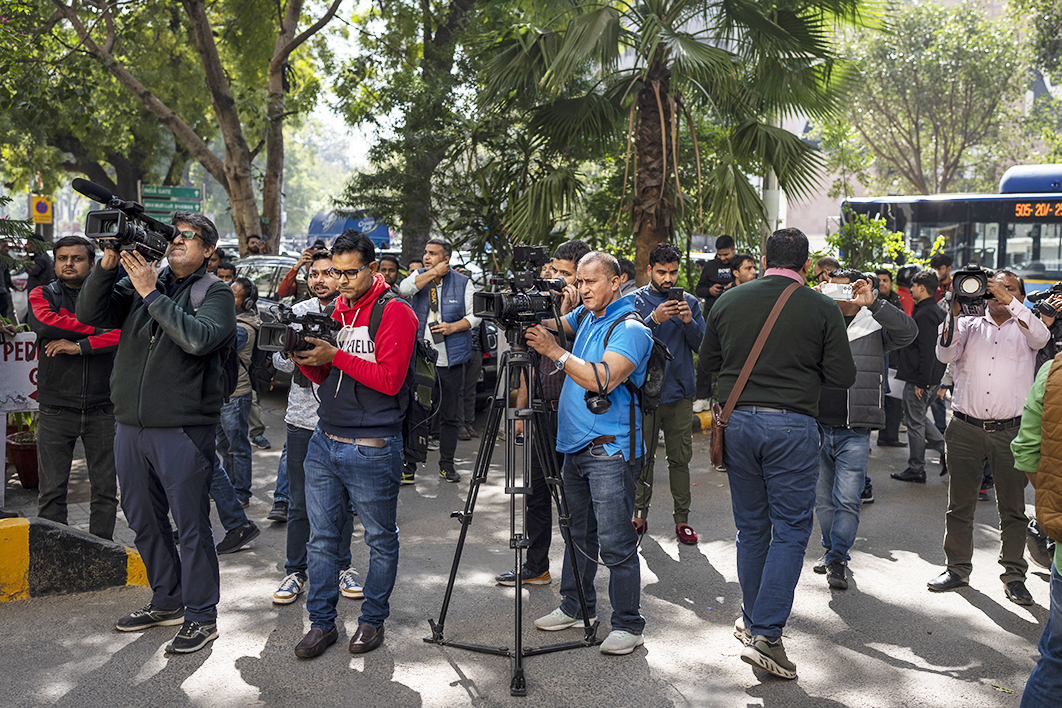The release of the two-part BBC documentary India: The Modi Question on 17 January was the first of a series of incidents to create a flutter in the safe and secure dovecote of Narendra Modi’s governing Bharatiya Janata Party, or BJP. Indian commentators are viewing the flurry of feathers in two different ways — but more about that later.
The two fifty-five-minute programs that make up India: The Modi Question contain almost nothing that has not been known in India for years. But the BBC’s involvement brought the stories to a global audience.
Part one unfavourably portrays Narendra Modi’s role as chief minister in the anti-Muslim riots in Gujarat state in 2002. It includes awkward and embarrassing videoclips of Modi’s speeches and interviews at the time. Part two focuses on the unenviable human rights record of Modi’s national government, and especially its treatment of India’s Muslim minority of close to 200 million people, or around 14 per cent of the population. The Indian government has banned the showing of the first but not the second part.
The documentary was immediately denounced by the Indian external affairs ministry for “the bias, the lack of objectivity, and frankly a continuing colonial mindset.” The documentary, the ministry’s Arindam Bagchi added, “is a reflection on the agency and individuals that are peddling this narrative again.”
Not surprisingly, the ban on part one led to curiosity in India about what it contained. Illegal showings were organised, and zealous police clashed with student groups screening the documentary in universities.
A month later, on 14 February, the national government’s income tax authorities began what became a three-day “survey” of BBC offices in New Delhi and Mumbai. It was not a “raid,” officials emphasised; “raids” happen after dark.
The survey, said the authorities, was the culmination of a longstanding investigation into the BBC’s alleged “deliberate non-compliance with Indian laws including transfer pricing rules and diversion of profits illegally.” Four days after the survey, authorities let it be known that “the income/profits shown by various group entities was not commensurate with scale of operations in India.” The BBC was reported to be waiting for an official notification of the charges.
For people whose memories extend back to 1975 a sense of déjà vu kicked in. The BBC was expelled from India in the first month after prime minister Indira Gandhi proclaimed an “emergency,” arrested political opponents and introduced censorship of the press. “Indira is India and India is Indira,” her supporters chanted, as she and her younger son attempted to build a personality cult around the prime minister. In India today, it is hard to look, listen or read without encountering prime minister Narendra Modi’s image.
The notion of a conspiracy against India had gained momentum earlier in February when the US financial firm Hindenburg, which specialises in short-selling, released a damaging report on the vast corporate structure of Gautam Adani, one of the richest men in the world. Adani and prime minister Modi are both Gujaratis, and their rise to international prominence in the past twenty years has coincided.
This epic has a long way to go, but listed shares in Adani companies have lost a lot of value, and Gautam Adani’s close connections with the prime minister have given the opposition in India’s parliament the first opportunity in years to challenge the government convincingly. Portions of speeches in parliament attacking the prime minister were ordered expunged from the record by the speaker.
The Adani group issued a 400-page rebuttal claiming the Hindenburg report was “a calculated attack on India, the independence, integrity and quality of Indian institutions, and the growth story and ambition of India.” Its rhetoric projected the Adani business empire as a symbol of India.
The most recent feather-ruffling came on 16 February when billionaire George Soros said, in the course of a long address, that the troubles of the Adani group and its links to the prime minister and his government might “significantly weaken Modi’s stranglehold on India’s federal government and open the door to push for much-needed institutional reforms.”
Soros’s remarks, declared an Indian magazine that supports Modi’s government, “largely validate the existence of a larger conspiracy to derail the Modi government.” Indian foreign minister S. Jaishankar, visiting Australia, described Soros as “old, rich, opinionated” and “dangerous,” and pointed out that India’s years under colonial rule had alerted it to the dangers of “outside interference.”
When Indira Gandhi was directing her “emergency” fifty years ago, the bitter experience of colonialism and the dangers of the “foreign hand” were frequent themes.
The flutter over the recent affronts to prime minister Modi and to India have been interpreted in two very different ways. At one pole, a respected and reflective columnist saw the possibility that “the first cracks” were appearing “in the hegemonic empire Modi and his BJP have built.” An activist who is also a serious electoral analyst had already calculated that a BJP victory in next year’s national elections could be difficult given the strength of local parties in many of India’s twenty-eight states.
At the other interpretive pole, the recent incidents are seen as opportunities for India to show its muscle and strut its stuff. According to pro-Modi figures, the “Western democracies” need a growing India more than India needs them — for economic and strategic reasons. Underlining India’s ability to wield economic and strategic influence, they point out that two Indian airlines have ordered almost a thousand passenger jets from Boeing and Airbus, and India is seen as a key element in making the Quad — an alignment of the United States, Japan, Australia and India — a significant entity.
The way to deal with the BBC, a BJP supporter noted, was not with clumsy denunciations and tax surveys. Rather, “the Indian diaspora” in Britain should be encouraged to join the movement to defund the broadcaster “unless the BBC gets out of bed with… left-liberals and Islamists of various hues.” A vast, influential diaspora with Indian roots was something Indira Gandhi didn’t have. Rishi Sunak and others should be expecting calls. •




